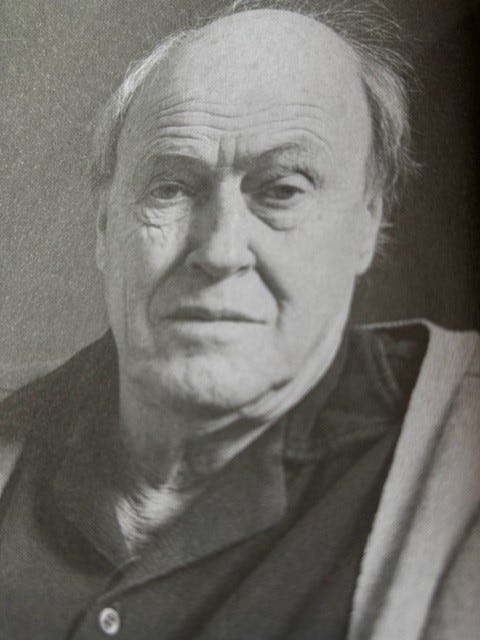JOHN LITHGOW
ROALD DAHL
I am writing this review as a substack post because I have a bit to say and moreover I think I need to put it into the context of some things that happened in the last few days. So let’s start there.
Earlier this week The Board of Deputies of British Jews published a report by it’s Commission on Antisemitism with key recommendations on how to tackle the disturbing rise in anti-Jewish discrimination in the United Kingdom. It heard testimony of the day-to-day experiences of Jewish people accessing services or working in particular organisations or sectors and made specific recommendations concerning the NHS and other industries and organisations.
The authors of the report, Lord Mann, the government’s antisemitism adviser and former defence secretary under the previous Conservative administration Penny Mordaunt, said they had been “stunned” and “alarmed” by the evidence they encountered.
In one section of the report, the authors write:
“ Many Jewish employees within NHS organisations feel that antisemitism in their workplace is not being addressed; for example, that that the issue of antisemitism has “simply been swept under the carpet.” We heard evidence that antisemitism makes some Jewish patients uneasy about a service that should be taking care of them. ..”
Next, also this week, the Medical Practitioners Tribunal Service lifted the interim suspension of Dr Rehiana Ali, who has a history of spreading conspiracy theories about Jews and talking about “Jewish extremism”.
The MPTS appeared to accept Ali’s claim during her hearing that she was speaking “about Israel and Israelis”, despite considerable evidence to the contrary, including the sharing of the false conspiracy theory that “4,000 Jews did not show up to work” on 9/11 and an attempt to ask whether Richard Nixon’s identification of a number of people as Jewish in White House tape recordings “explained” the Watergate scandal which led to his resignation. Ali also shared a claim that “Judaism is the only religion in human history whose religious texts (e.g., Mishneh Torah) literally prescribe a sacred command to kill every Christian on earth”, with her own statement above the claim saying “I think people need to address Jewish extremism especially Christians.”
The Health Secretary, Wes Streeting said of this case and others, “There have been cases of medics who’ve said things that would make me feel uncomfortable, treated by those medics and even unsafe being treated by the and I am not Jewish.”
And then, I watched a video in which the great performer, Mandy Patinkin (who I have met and consider to be a man of sincerity and integrity) really let go against the Israeli PM, Benyamin Netanyahu, with such passion and anger that it really made me consider my own position on the Gaza situation.
He used the following words:
“ And I ask Jews all over the world to consider what this man, Benjamin Netanyahu, and his right-wing government is doing to the Jewish people all over the world.
They are endangering not only the state of Israel, which I care deeply about and want to exist, but they are endangering the Jewish population all over the world.
He is the most dangerous thing, not just since October 7th. It is it has been a a a deeply troubled situation and endangering the Jews by endangering those in Gaza. and to watch what is happening for the Jewish people.
To allow this to happen to children and civilians of all ages in Gaza for whatever reason is unconscionable and unthinkable.
And I ask you Jews everywhere all over the world to spend some time alone and think, is this acceptable and sustainable?
This from a man who wears his Jewishness on his sleeve, loves Israel and cares deeply about other Jews. I recall that when we met backstage after his show courtesy of an introduction from a US friend, he said he was so pleased that Jews were coming to see him. It moved me.
And so to Giant, a play that moved me, shocked me, and stunned me more, I think, than any other afternoon or evening in the theatre. The debut play by Mark Rosenblatt was completed I believe, shortly before the events of October 7th, but you could mistakenly be forgiven that it was written yesterday. It is directed with exceptional potency by Nicholas Hytner (a Jew)
Giant is about the celebrated children’s writer Roald Dahl and imagines a fictitious day in 1983, just prior to publication of ‘The Witches’ when Dahl, with his fiancée Felicity, is visited by his British publisher Tom Maschler and a representative of his American publisher, Jessica Stone. The play starts with Dahl poring over proofs of The Witches, both admiring the handiwork of his illustrator, Quentin Blake, and critical of it, jealous, resentful about the share of royalties.
The meeting follows an almighty row over a book review written by Dahl. Reviewing Australian author Tony Clifton's ‘God Cried’ , a picture book about the siege of West Beirut during the 1982 Lebanon War, Dahl used several antisemitic tropes, including claiming that the United States was "dominated by Jewish financial institutions". He’d written of “a race of people” – the Jews – who had “switched so rapidly from being much-pitied victims to barbarous murderers”, and that the US was “so utterly dominated by the great Jewish financial institutions” that “they dare not defy” Israel.
Interviewed by the New Statesman in 1983, he said: “There is a trait in the Jewish character that does provoke animosity, maybe it’s a kind of lack of generosity towards non-Jews. I mean, there’s always a reason why anti-anything crops up anywhere.”
He added: “Even a stinker like Hitler didn’t just pick on them for no reason.”
A few years later in 1990, in an interview with the Independent he said, “I’m certainly anti-Israeli, and I’ve become anti-Semitic… It’s the same old thing: we all know about Jews and the rest of it. There aren’t any non-Jewish publishers anywhere, they control the media – jolly clever thing to do – that’s why the president of the United States has to sell all this stuff to Israel.”
This is a two hour twenty minute show in which Dahl’s casual antisemitism gradually uncovers a hatred of which he seems proud and which, possibly with a view to some intent to self destruct, he wants acknowledged by the world, despite the pleas of his publishers and his put upon fiancée to put out an apology.
Dahl tries to justify his Jew hate by the conduct of the Israeli government and army in when Israel invaded southern Lebanon in 1982. The invasion followed a series of attacks and counter-attacks between the Palestine Liberation Organization (PLO) operating in southern Lebanon and the Israel Defence Forces (IDF), which had caused civilian casualties on both sides of the border. But latterly, the mask slips and anti Israel rhetoric segues into naked antisemitism
This must be one of the only plays I have ever seen with a lot of laugh lines, sarcastic, rude, and witty- from Dahl,- but at which I was not able to laugh. They were so shocking, some of them, that there were audible gasps from the packed house.
I do not exaggerate when I say I was leaning foreword from my seat in the Dress Circle, mouth open, agog at what I was seeing, for the entirety of the show.
John Lithgow is simply superb as Dahl, so convincing that you forget you’re watching a performance by an actor. It’s one of the great performances and his Olivier win is fully justified, and then some.
In some ways Elliot Levey (a Jew and two-time Olivier award winner for the roles of Herr Schultz in Cabaret (2022) and as Tom Maschler (2025) ), who plays Maschler (a Jew) is the most complex character. He is a real person and was head of the publishing company Jonathan Cape. He is a holocaust survivor but almost until his client, Dahl, goes too far, is prepared to accommodate Dahl’s prejudices, partially because he is a valuable asset but also that his own Jewishness is very much secondary to his desire to be considered part of the British establishment and considers antisemitism somewhat of a minor inconvenience. Eventually Dahl does go too far in taunting Maschler. Levy also gives a tremendous and nuanced reading of this difficult role, again fully worthy of his Olivier.
I recognise his character in contemporary Jewish society, as I would have done in 1930s Berlin. As Herr Shultz says in the finale of ‘Cabaret’- [
“I know I am right. I understand the Germans.
After all, what am I? A German.”
Aya Cash as Jessica Stone (a fictitious character) starts off as an admirer, anxious to please Dahl, wanting him to sign a book for disabled son to whom she reads, but as soon as it is realised that she, too, is Jewish, proudly so, if not particularly religious, Dahl starts to taunt her and question her motivations, loyalties which leads to an explosive end to Act 1 when Cash delivers a speech so intense and profound I was moved to tears. Another electric performance.
Rachel Sterling’s role as Felicity Crossland, I felt was somewhat underwritten. Her love for Dahl appears unaffected by his racism, which she does not appear to discourage. yet she too wants to encourage an apology for purely pragmatic reasons.
So there are themes to this play in several layers, antisemitism, artistic responsibility, the impact of public figures' views, and the conflict between personal beliefs and professional reputation.
Despite this man being a monster in his personal life, I admit I’ve seen the Witches on screen and more recently as a musical at the National Theatre to which I took my great granddaughter. Should I have gone and enjoyed the Art, despite the character of the Artist?
By celebrating an individual for their talent despite their vile views, are we encouraging the casual and mainstream antisemitism which is now so prevalent in society. Should we, as Jews, accept that those who we would wish to trust, children’s writers and medical professional alike, might hate us, or any minority, for who we are and that is OK?
Or is that acceptance the first step on the road to the cattle trucks?
Whether ‘The Witches’ is antisemitic (as is suggested in the play, it might be seen by some), ‘Giant’ is a Giant of a play which should make us think more and talk less.







Interesting review. I was talking to someone else about this play (another Jew) who said that he felt the mostly non-Jewish audience did not understand the "jokes" at which your and my mouth fell open. They laughed. It worried him. I was sat near a very nice home counties lady in her early 70s who at the end of the first half said to me sotte voce "but he didn't really think that, did he?" in a shocked voice. I told her he did and that he doubled down and took ownership of his antisemitism ultimately. She plainly didn't believe me. It was all confirmed in the second half. She left without engaging me at the end so I don't know if she believed it or not.